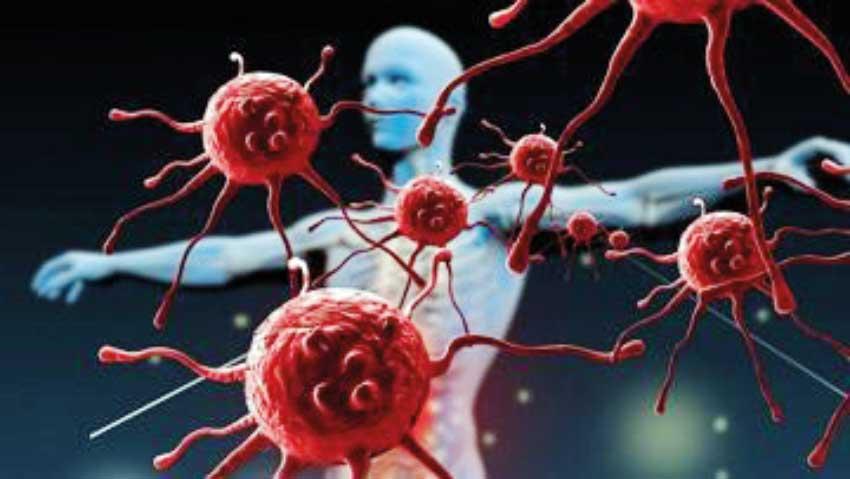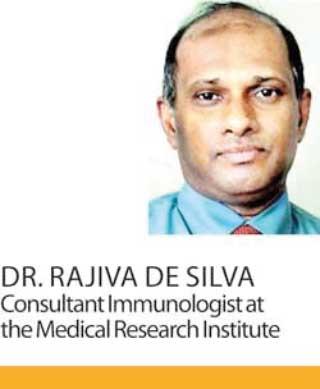Reply To:
Name - Reply Comment

 A person’s immune system is supposed to protect them from infections and fight against infectious agents and other agents that cause diseases. But what if the immune system is not able to do so? What if it cannot mount an adequate immune response to ward off infections and this results in frequent and recurrent infections? Well, if someone does have a primary immunodeficiency disease, they are likely to experience this. “A primary immunodeficiency disease occurs when there is a genetic defect in the immune system. This can cause the immune system to not function properly and result in the person getting severe and recurrent infections,” explained Dr. Rajiva de Silva, Consultant Immunologist at the Medical Research Institute (MRI). He explained that usually people with this condition, were likely to experience recurrent infections but for some, would experience autoimmunity.
A person’s immune system is supposed to protect them from infections and fight against infectious agents and other agents that cause diseases. But what if the immune system is not able to do so? What if it cannot mount an adequate immune response to ward off infections and this results in frequent and recurrent infections? Well, if someone does have a primary immunodeficiency disease, they are likely to experience this. “A primary immunodeficiency disease occurs when there is a genetic defect in the immune system. This can cause the immune system to not function properly and result in the person getting severe and recurrent infections,” explained Dr. Rajiva de Silva, Consultant Immunologist at the Medical Research Institute (MRI). He explained that usually people with this condition, were likely to experience recurrent infections but for some, would experience autoimmunity.
 He also further stated that there were 10 groups of primary immunodeficiency diseases and the commonest were Antibody deficiencies. Antibody deficiency makes up to 60% of all primary immunodeficiency diseases diagnosed globally, including in Sri Lanka. People with antibody disorders cannot produce antibodies to fight off infections making them susceptible to frequent infections.
He also further stated that there were 10 groups of primary immunodeficiency diseases and the commonest were Antibody deficiencies. Antibody deficiency makes up to 60% of all primary immunodeficiency diseases diagnosed globally, including in Sri Lanka. People with antibody disorders cannot produce antibodies to fight off infections making them susceptible to frequent infections.
Common primary immunodeficiency diseases in Sri Lanka
Dr. de Silva stated that the most common, clinically significant immunodeficiency in Sri Lanka was Common Variable Immunodeficiency (CVID) and X linked Agammaglobulinema (XLA). Like other immunodeficiency diseases, XLA patients show symptoms in childhood (5-6 months after birth) but CVID could appear in a patient at any age due to the B-cells not being able to produce adequate antibodies. While XLA only affects males, CVID affected both males and females.
Risks
“Risks are dependent on the disorder. In XLA, if the mother is a carrier there is a 50% chance that the son will get affected. In CVID, in most instances a genetic cause cannot be identified while 20% of the time genes are responsible,” Dr. de Silva shared.
He also stated that if there is a family history of recurrent infections and a family history of immunodeficiency, that person would be at a higher risk for a primary immunodeficiency disorder. “Especially if a sibling or first degree relative is affected with recurrent infections or immunodeficiency disorder, then there is a risk that the person would be affected too,” he explained.
Treatment
While the treatment for immunodeficiency disorders differed according to the type of disorder, Dr. de Silva noted that early detection prevented further complications like permanent lung damage. “It is important that the person gets diagnosed early to prevent complications. However, in certain diseases like SCID (Severe Combined Immunodeficiency Disorder), the only cure is a stem cell transplant. However, it is very expensive and also it’s not easy to find donors.” He also mentioned that most patients with primary immunodeficiency disorders are treated with intravenous immunoglobulins which is provided by the government free of charge.
“I have also noted that many discontinue the treatment when they feel better, but it shouldn’t be done because it can cause various complications resulting in the death of the patient,” he warned.
Dr. de Silva mentioned that gene therapy was also a treatment method for certain immunodeficiency disorders.
Message to clinicians and the public
Emphasizing that it was important to detect immunodeficiency disorders at an early stage, he stated that clinicians must be observant and refer the patient to an immunologist if the patient has recurrent or severe infections. “Mostly paediatricians are aware because most immunodeficiency disorders are diagnosed at childhood, but adults too can get diagnosed with immunodeficiency disorders. Therefore, clinicians should be on the lookout.” Dr. de Silva also stated that live vaccines should not be given to infants and people who have recurrent infections or people whose siblings or first degree relatives have severe recurrent infections or are diagnosed with an immunodeficiency disorder or people who have had unexplained infant deaths in the family. “Before live vaccines such as BCG are given to such people, I request clinicians to do a thorough investigation,” he said, adding that about 50 patients are diagnosed with primary immunodeficiency disorders every year in Sri Lanka, but it is not easy to diagnose them.
He also shared that such people should also be cautious and test for immunodeficiency disorders. He mentioned that those diagnosed with immunodeficiency disorders should listen to their doctors and follow their advice.
“Around 20 years ago, many people with immune deficiency died. Now we can identify the cause and treat the patients. We are able to prevent serious complications and lower mortality rates if tested early and if treatment is followed properly,” he remarked.